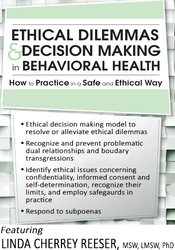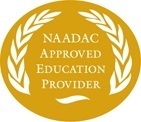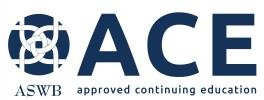Ethical Dilemmas and Decision Making in Behavioral Health: How to Practice in a Safe and Ethical Way
Credit Available - See CEs/Contact Hours tab below.
Total Credits: 6.25 **, 6.0 Ethics, 6.0 Addiction Counselors - NAADAC (SAS/NTA AP 1/2) (Self-Study), 6.0 California Alcoholism & Drug Abuse Counselors (CCAPP-EI), 6.25 Connecticut Addiction Counselors, 6.25 Counselors, 6.0 Texas Counselors, 6.0 South Carolina Counselors, Marriage & Family Therapists and Psycho-Educational Specialists, 6.25 Marriage & Family Therapists, 6.0 Texas Marriage & Family Therapists, 6.0 Illinois Marriage & Family Therapists, 6.25 Nurses, Nurse Practitioners, and Clinical Nurse Specialists, 6.0 California Nurses, 6.0 Florida Nurses, 7.6 Iowa Nurses, 6.0 Canadian Psychologists, 6.3 Florida Psychologists, 6.25 Psychologists, 6.25 Social Workers, 6.25 Canadian Social Workers, 6.25 Florida Social Workers, Marriage & Family Therapists, and Mental Health Counselors, 6.0 Illinois Social Workers, 6.0 Kansas Social Workers, 6.0 Minnesota Social Workers, 7.5 New York Social Workers, 6.25 Ohio Social Workers, Counselors, and Marriage & Family Therapists, 6.0 Pennsylvania Social Workers, Counselors, and Marriage & Family Therapists, 6.0 California Social Workers, Counselors, Marriage & Family Therapists, and Licensed Educational Psychologists, 6.25 Other Professions
- Average Rating:
- Not yet rated
- Categories:
- Boundaries & Ethics | Legal
- Trainer:
- Linda Cherrey Reeser, PhD
- Duration:
- 6 Hours 04 Minutes
- Format:
- Audio and Video
- Original Recording Date:
- Sep 30, 2016
Description
- Ethical decision-making model to resolve or alleviate ethical dilemmas
- Recognize and prevent problematic dual relationships and boundary transgressions
- Identify ethical issues concerning confidentiality, informed consent and self-determination, recognize their limits, and employ safeguards in practice
- Respond to subpoenas
As a mental health professional, you are confronted on a regular basis with the challenges of complex ethical and legal issues. Knowing and applying an ethical decision-making framework will provide you with tools to:
- manage ethical issues in a systematic way
- separate facts from assumptions and biases
- track the potential harms of each course of action
- formulate an ethical rationale for selecting the least harmful option
- decide on the most appropriate way to implement your choice
- assess what went wrong, or could go wrong, so you can prevent it from happening
Watch this recording and learn a unique decision making model that does not tell you which ethical principle is most important (as do some other models), but provides you with options and raises critical questions to help you decide which principle trumps others. Learning this model will also help you to formulate reasons for choosing how to intervene with other professionals or clients in an ethical and safe way. This reflective model will enable you to be the proactive practitioner you want to be!
Through case examples, you will be able to apply the skills right away! Case examples will focus on the issues of confidentiality, informed consent, boundaries and dual relationships and self-determination.
CEs/Contact Hours
NOTE: Tuition includes one free CE Certificate (participant will be able to print the certificate of completion after completing the on-line post-test (80% passing score) and completing the evaluation).
Continuing Education Information: Listed below are the continuing education credit(s) currently available for this non-interactive self-study package. Please note, your state licensing board dictates whether self-study is an acceptable form of continuing education. Please refer to your state rules and regulations. If your profession is not listed, please contact your licensing board to determine your continuing education requirements and check for reciprocal approval. For other credit inquiries not specified below, please contact cepesi@pesi.com or 800-844-8260 before the event.
Materials that are included in this course may include interventions and modalities that are beyond the authorized practice of your profession. As a licensed professional, you are responsible for reviewing the scope of practice, including activities that are defined in law as beyond the boundaries of practice in accordance with and in compliance with your profession's standards.
This self-study activity includes 6.0 hours of GENERAL ethics instruction. Not all boards allow ethics credit for self-study products. If ethics is not specified within your licensing board’s approval statement below, please contact your board to determine the applicability and amount of ethics allowed.
This self-study course has been approved by PESI, Inc., as a NAADAC Approved Education Provider, for 6.0 CE in the Legal, Ethical and Professional Development skill group. NAADAC Provider #77553. PESI, Inc. is responsible for all aspects of their programming. Full attendance is required; no partial credit will be awarded for partial attendance.
PESI, Inc. is an approved provider by the CCAPP-EI, Provider #: OS-03-036-1021. This activity meets the qualifications for 6.0 CEH's (continuing education hours).
Provider #120924. This course has been approved as a CCB approved training and has been awarded 6.25 hours by the Connecticut Certification Board.
This intermediate self-study activity consists of 6.25 clock hours of continuing education instruction. Credit requirements and approvals vary per state board regulations. Please save the course outline, the certificate of completion you receive from the activity and contact your state board or organization to determine specific filing requirements.
PESI, Inc. has been approved as a continuing education sponsor through the Texas State Board of Examiners of Professional Counselors. Provider #: 2477. This self-study course qualifies for 6.0 continuing education credits.
This program has been approved for 6.0 continuing education hours by the South Carolina Board of Examiners for Licensure of Professional Counselors, Marriage and Family Therapists, and Psycho-Educational Specialists. Approval #4540.
This self-study activity consists of 6.25 clock hours of continuing education instruction. Credit requirements and approvals vary per state board regulations. Please save this course outline, the certificate of completion you receive from this self-study activity and contact your state board or organization to determine specific filing requirements.
PESI, Inc. has been approved as a continuing education sponsor through the Texas State Board of Examiners of Marriage and Family Therapists. Provider # 503. This self-study package qualifies for 6.0 continuing education credits.
PESI, Inc. has been approved as a provider of continuing education by the State of Illinois, Department of Professional Regulation. Provider #:168-000156. Full attendance at this self-study activity qualifies for 6.0 credits.
This intermediate activity is approved for 6.25 clock hours of continuing education instruction. Credit requirements and approvals vary per state board regulations. Please contact your licensing board to determine if they accept programs or providers approved by other national or state licensing boards. A certificate of attendance will be awarded at the end of the program to participants who are in full attendance and who complete the program evaluation.
PESI, Inc. is a provider approved by the California Board of Registered Nursing, Provider #: 17118 for 6.0 self-study contact hours.
** You will need to provide your license number to PESI. PESI must have this number on file in order for your hours to be valid.
PESI, Inc. is an approved provider by the Florida Board of Nursing. Provider #: FBN2858. These materials qualify for 6.0 self-study contact hours.

PESI, Inc. is an approved provider by the Iowa Board of Nursing. Provider #: 346. Nurses successfully completing these self-study materials will earn 7.6 self-study contact hours. Please email cepesi@pesi.com with your license number, include the title, speaker name and date. PESI must have this number on file in order for your hours to be valid.
PESI, Inc. is approved by the Canadian Psychological Association to offer continuing education for psychologists. PESI, Inc. maintains responsibility for the program. This program is approved for 6.0 self-study continuing education hours. Full credit statement at: www.pesi.com/cpa-statement

PESI, Inc., is an approved provider with the Florida Board of Psychology.Provider Number #50-399.This product qualifies for 6.3 self-study continuing education credits.
This self-study activity consists of 6.25 clock hours of continuing education instruction. Credit requirements and approvals vary per state board regulations. Please save the course outline, the certificate of completion you receive from this self-study activity and contact your state board or organization to determine specific filing requirements.
PESI, Inc., #1062, is approved to offer social work continuing education by the Association of Social Work Boards (ASWB) Approved Continuing Education (ACE) program. Organizations, not individual courses, are approved as ACE providers. State and provincial regulatory boards have the final authority to determine whether an individual course may be accepted for continuing education credit. PESI, Inc. maintains responsibility for the course. ACE provider approval period: January 27, 2017 - January 27, 2020. Social Workers completing this course receive 6.25 (Ethics) continuing education credits for completing this intermediate level course. A certificate of attendance will be awarded at the end of the program to social workers who complete the program evaluation. Full attendance is required. No partial credit will be offered for partial attendance.
PESI, Inc., #1062, is approved to offer social work continuing education by the Association of Social Work Boards (ASWB) Approved Continuing Education (ACE) program. Organizations, not individual courses, are approved as ACE providers. State and provincial regulatory boards have the final authority to determine whether an individual course may be accepted for continuing education credit. PESI, Inc. maintains responsibility for the course. ACE provider approval period: January 27, 2017 - January 27, 2020. Social Workers completing this course receive 6.25 (Ethics) continuing education credits for completing this intermediate level self-study course. A certificate of attendance will be awarded at the end of the program to social workers who complete the program evaluation. Full attendance is required. No partial credit will be offered for partial attendance. Canadian provinces may accept activities approved by the ASWB for ongoing professional development.

PESI, Inc. is an approved provider with the Florida Board of Clinical Social Work, Marriage and Family Therapy and Mental Health Counseling. Provider Number #50-399. This self-study course qualifies for 6.25 continuing education credits.
PESI, Inc. is an approved provider with the State of Illinois, Department of Financial and Professional Regulation, Division of Professional Regulation. License #: 159-000154. Successful completion of this self-study activity qualifies for 6.0 contact hours.
PESI, Inc. is an approved provider with the Kansas Behavioral Sciences Regulatory Board. Provider #14-006. This self-study course has been approved for 6.0 continuing education hours.
PESI, Inc. is an approved provider with the State of Minnesota, Board of Social Work. Provider #: CEP-140. This self-study package has been approved for 6.0 continuing education hours. This certificate has been issued upon successful completion of a post-test.
PESI, Inc. is recognized by the New York State Education Department's (NYSED) State Board for Social Work as an approved provider of continuing education for licensed social workers #SW-0008. This self-study activity will qualify for 7.5 contact hours. Full attendance is required; no partial credits will be offered for partial attendance.
PESI, Inc. is an approved provider with the State of Ohio Counselor, Social Worker and Marriage & Family Therapist Board. Provider approval #: RCST071001. Successful completion of this self-study course meets the qualifications for 6.25 clock hours of continuing education credit.
This intermediate activity is approved for 6.0 clock hours of continuing education instruction. Credit requirements and approvals vary per state board regulations. Please contact your licensing board to determine if they accept programs or providers approved by other national or state licensing boards. A certificate of attendance will be awarded at the end of the program to participants who are in full attendance and who complete the program evaluation.
The State of California, Board of Behavioral Sciences will recognize and accept continuing education programs that are sponsored by providers approved by the APA and the ASWB. Full participation in this self-study course will qualify for 6.0 hours of continuing education credit.
This self-study activity qualifies for 6.25 continuing education clock hours as required by many national, state and local licensing boards and professional organizations. Save your activity advertisement and certificate of completion, and contact your own board or organization for specific requirements.
Handouts
| Manual (0.82 MB) | 44 Pages | Available after Purchase |
Trainer
Linda Cherrey Reeser, PhD Related Seminars and Products
Western Michigan University
Linda Cherrey Reeser, PhD, is a licensed social worker who has been teaching and consulting in Michigan for over 30 years. Dr. Reeser’s areas of professional expertise include ethics, professionalism, field education, activism and social change.
Dr. Reeser wrote a book on ethics with Dr. Wade Robison, Ethical Decision Making in Social Work (Allyn & Bacon). She is a long-standing member of the National Association of Social Workers (NASW) and has served on the Michigan Chapter Board as well as the Michigan NASW Ethics Committee.
Dr. Reeser is a full professor in the School of Social Work at Western Michigan University in Kalamazoo Michigan, where she serves as the coordinator of the BSW program, and has been teaching undergraduate and graduate social work students for 34 years.
She received the Teaching Excellence Award from her college and the NASW Michigan Chapter Lifetime Achievement Award for her contributions to the social work profession. She has been sought out by lawyers for her expertise in ethics. Her practice experience is in criminal justice and substance abuse.
Speaker Disclosures:
Financial: Linda Cherrey Reeser is a professor at Western Michigan University, School of Social Work. She receives a speaking honorarium from PESI, Inc. She has no relevant financial relationships with ineligible organizations.
Non-financial: Linda Cherrey Reeser has no relevant non-financial relationship to disclose.
Target Audience
Addiction Counselors, Case Managers, Counselors, Marriage & Family Therapists, Nurses, Psychologists, Social Workers and other Mental Health Professionals
Objectives
- Utilize an ethical decision making framework to recognize, analyze, resolve and/or prevent ethical problems and dilemmas in your clinical practice.
- Communicate how an understanding of common boundary and dual relationship issues/dilemmas can help you maintain appropriate relationships with your clients.
- Determine conditions and limits of self-determination in order to avoid negatively impacting the therapeutic alliance.
- Identify ethical issues concerning confidentiality and informed consent, recognize their limits and employ safeguards in your clinical practice.
- Analyze the limits of confidentiality as it relates to duty to warn law in clinical practice.
- Recognize ethical challenges you should consider when responding to subpoenas that request disclosure of client records.
Outline
Common Ethical Issues
- Professional obligations vs clients’ rights
- Conflicting obligations and expectations
- Professional truth telling to clients
- Distribution of limited resources
- Professional adherence to regulations and policies that may harm clients
Ethical Codes
- Characteristics, functions, and limits
- The intersection of the law and ethical codes: congruence and conflict
Defensive and Safe Practice
- Practice according to the law
- Steps to reduce legal vulnerability
- Respond to subpoenas
- Four elements of malpractice
- Responding to impaired, incompetent, and/ or unethical behavior of professionals
- Duty to warn law
Practice Ethical Self-Reflection
- How demographic characteristics, values and beliefs influence ethical decision making
- Prioritization of ethical principles
- Ability to tolerate morally ambiguous situations
Apply a Model of Ethical Decision Making
- Discern the facts
- Assess ethical principles in conflict
- What may or did go wrong and why
- Short and long-term goals and their compatibility
- Assess the harms of choosing different options
- Develop strategies to prevent or rectify errors
Confidentiality and Informed Consent
- Distinguish confidentiality, privacy and privilege
- Confidentiality violations and consequences
- Limits to confidentiality
- Situations that require informed consent
- Limits of informed consent
- Case examples and small group discussion
Dual Relationship, Boundary Errors and Ethical Dilemmas
- Signs of possible problems
- Set clear, appropriate and culturally sensitive boundaries
- Case examples and small group discussions
- Prevention of harmful dual relationships or other boundary violations
Self-Determination
- Conditions for self-determination
- Limits or interference
- Case examples and small group discussion





